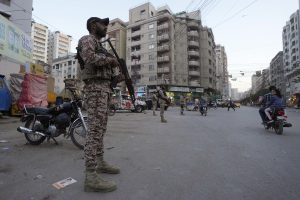In Karachi, Pakistan’s bustling financial capital, the daily news is often grim. Reports of citizens shot dead while resisting muggings and suspected robbers lynched have become disturbingly common.
Located on the coast of the Arabian Sea, Karachi was referred to as the “City of Lights” in the 1960s and 1970s because of its vibrant nightlife. However, ethnic and political conflict from the 1980s onward earned the city a spot on the list of the most dangerous cities. In 2014, the city ranked as the world’s sixth-most dangerous city for crime.
Over time, the increased police and paramilitary presence and security operations have made the city safer. In 2013, the Karachi Operation was launched in response to years of criminal, religious, and political violence. The campaign against crime and terrorism was authorized by the civilian government and led by the Pakistan Army and intelligence agencies. The Sindh Rangers, a special paramilitary force granted special policing powers to arrest and investigate criminals involved in targeted killings, kidnappings, terrorism, and extortion, led the operation. These measures drastically improved the law and order situation in the city, which accounts for around a quarter of Pakistan’s GDP.
Still, Pakistan’s commercial center remains marred by surging crime rates as the law and order situation deteriorates. In the last three years, more than 250 citizens were shot dead by street criminals and 1,052 were wounded. In 2024 alone, according to police data, 33 people were shot dead resisting robberies up to March 28. However, independent institutions’ reports suggest a higher figure: more than 50 people killed by robbers during the same period.
Karachi ranked 169th out of a total of 173 cities on the Economist Intelligence Unit’s Global Liveability Index in 2023. The index examines how cities around the world are recovering after the COVID-19 pandemic and rates them in five categories: stability, healthcare, culture and environment, education, and infrastructure. Karachi has an overall score of 42.5 out of 100 – a far cry from top performer Vienna, which scored 98.4. It scored the lowest on stability, with a 20, unchanged from 2022.
Skyrocketing inflation and growing economic difficulties in the last three years are cited as reasons for the increase in violent street crimes.
The Human Rights Commission of Pakistan expressed deep concern over the law and order situation, stating that it has “deteriorated alarmingly.”
“The underlying factors such as economic desperation and unemployment need to be addressed urgently as well,” it said in a post on X (formerly Twitter) while demanding the immediate restoration of law and order to ensure the rights of life and security for the citizens of Karachi.
Despite high-level meetings chaired by President Asif Ali Zardari issuing directives to take strict action against street criminals and the Sindh High Court’s Chief Justice Aqeel Ahmed Abbasi ordering law enforcement agencies to launch a crackdown on criminals, the law and order situation in the city has kept citizens anxious about their safety.
Ayesha Mirza is a 24-year-old journalist who lives in Karachi. Some of her earliest memories include getting mugged with her family – the first time when she was only 7 years old and again when she was 12.
“It is a constant topic of conversation. When one sees a motorcyclist or someone approaching them, it makes one jumpy and scared. One is constantly thinking about their safety,” Mirza told The Diplomat.
For her, as a woman, getting her phone snatched is more than an inconvenience; it is a primary concern for her digital safety. “It has my data, my private photos, and online banking, so there’s a lot more at risk than just the monetary loss,” she said.
When commuting to her workplace, Mirza is constantly calculating and analyzing the likelihood of becoming a victim of street crime if she takes a particular route.
“The majority of the people do not have the privilege or option to decide what areas to avoid and when to commute, especially if they have work or their homes in what have become street crime hotspots. Those people, in particular, experience heightened fear and paranoia,” she explained.
Living in a city with high crime rates and being a victim from early childhood has left a deep mark on Mirza – she still has nightmares about being mugged. “The fear is palpable and ever-present, especially now when there have been incidents where robbers have shot people even after one has given them everything without resistance.”
Muhammad Hanif, a 60-year-old shop owner, has seen Karachi at its best and worst times. “No one is safe in Karachi anymore, and we’re only living on God’s mercy. Instead of dealing with criminals, police are involved in getting bribes from business owners in the bazaar,” he told The Diplomat. A year ago, someone was murdered in front of Hanif’s eyes in the market over a feud.
Shop owners in the market have started to shut down their businesses early to avoid being mugged.
Muhammad Ahmed, 30, who owns a store selling cosmetic products, used to keep his shop open until late at night before concerns about safety forced him to rethink that approach. “Many customers would shop late, but after a couple of months, I started shutting down the store around 9 p.m,” he said.
Ahmed Baloch, 37, who owns a garment shop in Bohri Bazaar, has been a victim of street crimes more than once. Seven years ago, his bike, which he bought after saving 45,000 rupees (roughly $160), was snatched at gunpoint, and five months ago, his mobile phone was taken.
“I carry a few hundred rupees with me now and have switched to a keypad phone,” he told The Diplomat.
Despite efforts to improve security, Karachi, a vibrant city that hosts hundreds of thousands of migrants from all over Pakistan and serves as the financial hub, remains gripped by a surge in violent street crimes. To ensure the safety of its residents, it is essential that the provincial government takes urgent and sustained actions.

































